Select Language
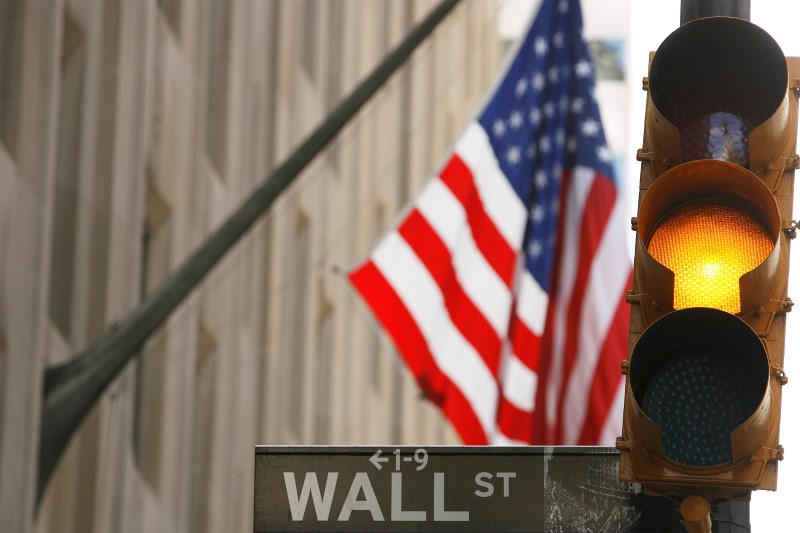
U.S. stock index futures steadied on Monday evening after a mix of bargain buying and some positive economic data helped Wall Street mark a two-day rebound from correction territory.
But gains were limited amid caution before a Federal Reserve meeting this week, while investors were also awaiting more cues on artificial intelligence from Nvidia’s developer conference.
Caution over President Donald Trump’s plans for more trade tariffs continued to weigh, as Trump warned that more duties will be imposed by April 2.
But risk appetite took some support from chatter over a Russia-Ukraine ceasefire, with Trump set to speak to Russian President Vladimir Putin on Tuesday.
S&P 500 Futures were flat at 5,732.25 points, while Nasdaq 100 Futures steadied at 20,035.25 points by 19:29 ET (23:29 GMT). Dow Jones Futures steadied at 42,231.0 points.
Fed meeting front and center
Investors were focused squarely on a two-day Fed meeting- which begins on Tuesday- for more cues on the economy and interest rates.
The central bank is widely expected to keep rates unchanged, and is expected to signal few changes amid sticky inflation and heightened uncertainty over the economic impact of Trump’s policies.
Still, some signs of cooling in the labor market could push the Fed into softening its hawkish stance, as could growing speculation over a U.S. recession.
Nvidia developer conference awaited
NVIDIA Corporation (NASDAQ:NVDA) steadied in aftermarket trade following a 1.8% loss during Monday’s session.
The chipmaker was nursing heavy losses over the past month, as broader market sentiment soured, and as investors questioned just how much strength there remained in the AI trade amid increased market turmoil. Nvidia was trading down about 20% from its January record high.
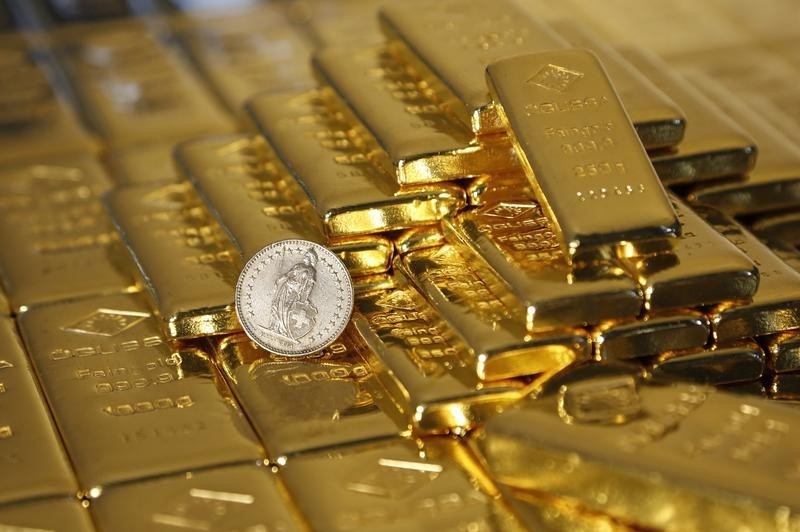
Investing.com-- Gold prices fell slightly in Asian trade on Monday after racing to record highs, as safe haven demand remained underpinned by uncertainty over trade tariffs and a slowing economy.
Haven demand was also boosted by increased geopolitical ructions in the Middle East, after the U.S. launched a wave of air strikes on Houthi rebels in Yemen in retaliation for their attacks on shipping lanes in the Red Sea.
But this trend was undermined by some signs of progress in Russia-Ukraine ceasefire talks, with President Donald Trump stating that he will speak to Russian President Vladimir Putin on Tuesday.
Gold also saw some profit-taking after reaching record highs above $3,000 an ounce last week.
Spot gold fell slightly to $2,982.80 an ounce, while gold futures expiring in April fell 0.3% to $2,991.62 an ounce by 01:14 ET (05:14 GMT). Spot prices hit a record high of $3,005.08 an ounce on Friday.
Tariffs, economic jitters keep gold strong
Trump on Sunday evening repeated his threats of reciprocal and sectoral tariffs being imposed on April 2- a move that is widely expected to escalate a brewing global trade war.
But markets were uncertain over just how much Trump will commit to the tariffs, given that he had earlier this month flip-flopped on measures against Canada and Mexico.
Still, the two countries, along with China and the European Union, outlined retaliatory measures against the U.S., and are expected to impose even stricter measures against Trump’s reciprocal tariffs.
Fears of trade-related disruptions and a potential tariff-driven bump in inflation drummed up fears of a U.S. recession.
Haven demand was also furthered by anticipation of a barrage of central bank meetings this week, most notably the Federal Reserve, Bank of Japan, and the Bank of England.
U.S. industrial production and retail sales date is also set to provide more cues on the world’s biggest economy.
Other precious metals were a mixed bag after clocking strong gains in recent sessions. Platinum futures rose 0.5% to $1,018.0 an ounce, while silver futures fell 0.3% to $34.328 an ounce. Silver prices briefly touched a five-month high.
Copper steady with China stimulus in focus
Among industrial metals, copper prices steadied on Monday with focus squarely on more stimulus measures in China. Expectations of more support from Beijing had spurred a strong run-up in copper prices over the past month.
Benchmark copper futures on the London Metal Exchange rose 0.1% to $9,805.40 a ton, while May copper futures were flat at $4.8950 a pound.
Sentiment over China- the world’s biggest copper importer- was boosted by Beijing announcing a host of measures to boost private consumption. Stronger-than-expected industrial production data also aided sentiment.
Copper was also boosted by Trump flagging plans to impose 25% tariffs on all copper imports- a move that could severely tighten physical supplies in the U.S.
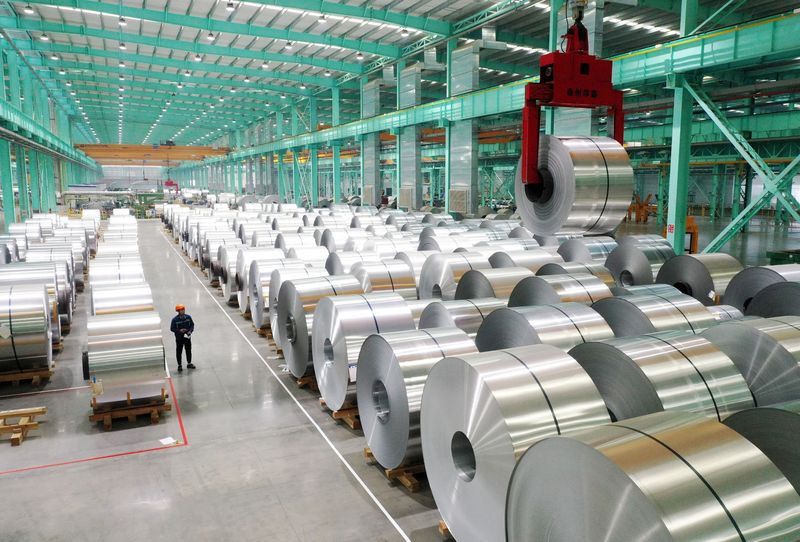
ABOARD AIR FORCE ONE (Reuters) -U.S. President Donald Trump said he has no intention of creating exemptions on steel and aluminum tariffs and said reciprocal and sectoral tariffs will be imposed on April 2.
Last month, Trump raised tariffs on imports of steel and aluminum to a flat 25%, without exemptions or exceptions, in a move that was designed to help U.S. industry while contributing to an escalating trade war.
Speaking to reporters on Air Force One, Trump said reciprocal duties on U.S. trading partners would come alongside auto duties.
"In certain cases, both," Trump said when asked if he would be imposing sectoral and reciprocal tariffs on April 2. "They charge us, and we charge them. Then, in addition to that, on autos, on steel, on aluminum, we’re going to have some additional," he said.
Trump has said previously that he would impose reciprocal tariffs on U.S. friends and foes alike at the beginning of April.
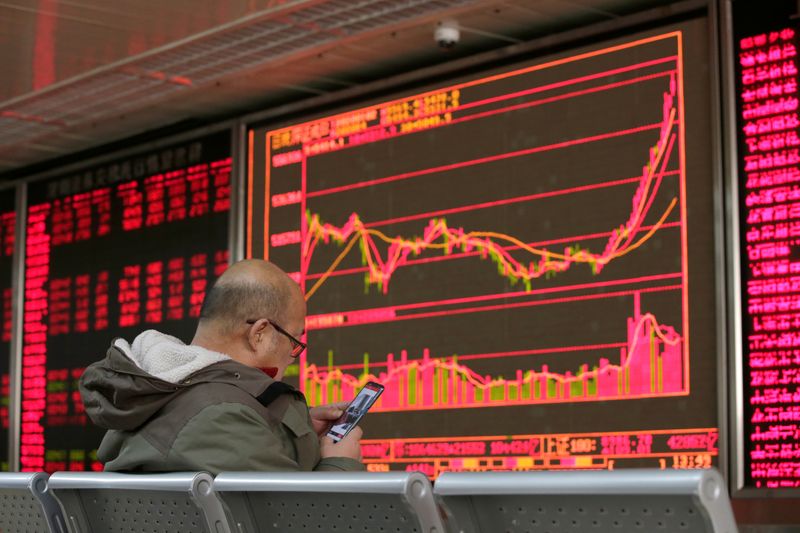
Investing.com-- Asian stocks rose on Monday tracking optimism over the Chinese economy after Beijing outlined targeted measures to boost spending, although persistent concerns over a U.S.-led trade war kept gains limited.
Regional markets also took a positive lead-in from a Friday rebound on Wall Street, although the rebound appeared to have petered out with U.S. stock index futures falling in Asian trade.
Persistent concerns over U.S. trade tariffs and slowing growth undermined overall risk appetite, as did anticipation of a barrage of key central bank meetings this week, particularly the Federal Reserve and the Bank of Japan.
Barring China, most Asian markets were nursing steep losses over the past month, amid heightened concerns over U.S. trade tariffs and a potential recession.
Chinese stocks buoyed by more stimulus cues
China’s Shanghai Shenzhen CSI 300 and Shanghai Composite indexes rose marginally, while Hong Kong’s Hang Seng index surged as much as 1%.
Sentiment towards the country was boosted chiefly by Beijing unveiling “comprehensive” measures aimed at boosting domestic consumption and driving up economic growth.
A report from the State Council outlined a plan to strengthen consumer demand by increasing wages, offering more subsidies and also increasing social welfare.
The planned measures are more promises from Beijing to boost sluggish private spending- which has been a major point of pressure on the Chinese economy over the past four years.
Data on Monday showed Chinese industrial production blazed past expectations in the first two months of 2025, while retail sales grew as expected. Fixed asset investment grew more than expected, while China’s unemployment rate unexpectedly rose.
Optimism over more Chinese stimulus and the country’s artificial intelligence capabilities drove a stellar rally in local markets so far in 2025, although a bulk of buying was directed towards Hong Kong.
A key Chinese loan prime rate decision is due later this week.
Japan’s Nikkei surges with BOJ in focus
Japan’s Nikkei 225 index added 1.1%, while the broader TOPIX index rose 1.2%.
Focus this week is squarely on a BOJ meeting, with the central bank widely expected to keep interest rates steady at its conclusion on Wednesday.
But investors will be watching for any commentary on the BOJ’s plans to hike interest further this year, amid signs of sticky Japanese inflation, rising wages, and positive economic growth.
Broader Asian markets took positive cues from China, with Australia’s ASX 200 index rising 0.6%. But the index did trim some gains after Treasurer Jim Chalmers flagged higher inflation and slower economic growth due to the impact of Cyclone Alfred.
Singapore’s Straits Times index rose 0.7% following mixed export data. The country’s key non-oil exports grew more than expected in February from the prior month, but year-on-year growth still missed expectations.
South Korea’s KOSPI rose 1.4% on bargain buying into major technology stocks. But sentiment towards the country remained strained before a key court ruling on impeached President Yoon Suk Yeol over his attempt to impose martial law in December. Anticipation of the decision- which is due this week- sparked mass rallies across South Korea.
Futures for India’s Nifty 50 index pointed to a mildly positive open, as the index nursed sustained losses since late-2024. Indian wholesale inflation data is due later on Monday.
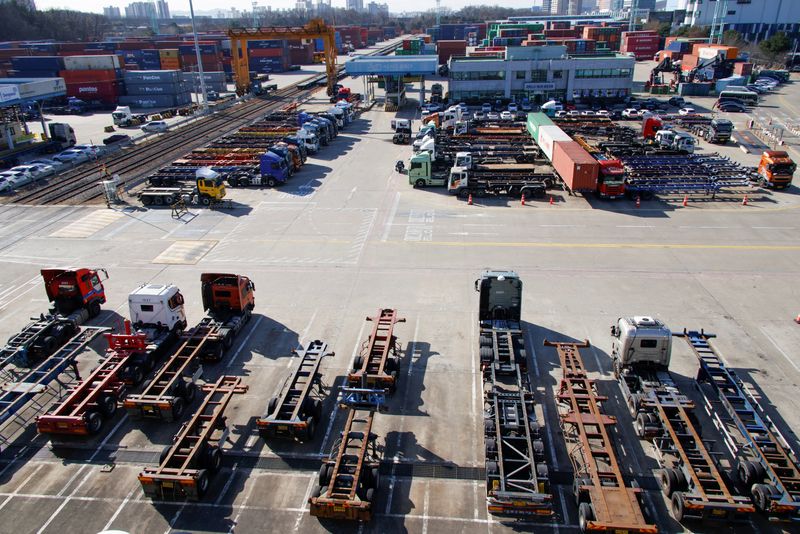
By Hyunjoo Jin
SEOUL (Reuters) - The United States has called for better access to the Korean market, particularly in the agriculture and technology sectors, South Korea’s trade minister said on Sunday.
Trade Minister Cheong In-kyo was returning from a trip to Washington where he asked his U.S. counterpart, Jamieson Greer, to exempt the country from tariffs if they go into effect in April.
But he expected U.S. President Donald to go ahead with announcing tariffs on April 2 as scheduled, especially on countries like South Korea which have trade surpluses with the United States.
U.S. officials did not mention beef specifically, but they said Korea needs to take action in terms of sanitary and quarantine measures, Cheong said, also citing regulations on technology firms - areas that they said make access to the Korean market challenging, the minister added.
South Korea, one of the top importers of U.S. beef, has allowed imports of U.S. beef since 2008, but only from animals less than 30 months old, due to public concerns about mad cow disease. The restriction was cited as one of the trade barriers to South Korea in a U.S. report.
Greer also warned of the approach by Korea and the European Union to regulating U.S. technology companies, during a Senate confirmation hearing in February.
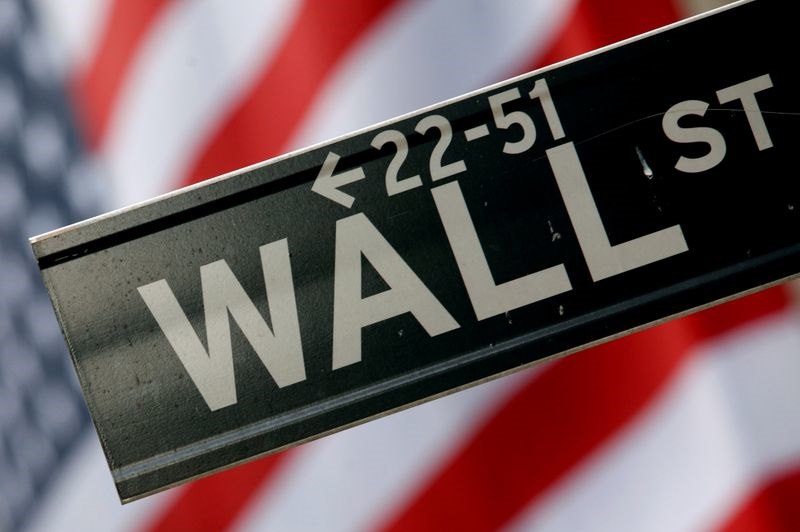
U.S. stock index futures fell on Sunday evening as a rebound on Wall Street, from correction territory, appeared to have stalled in the face of uncertainty over trade tariffs and the economy.
Investors were also on guard before more economic cues from a Federal Reserve meeting this week, with the central bank widely expected to keep rates unchanged.
Futures fell after a positive Friday session on Wall Street, where a measure of bargain buying helped indexes rebound from near six-month lows. Sunday’s losses suggested that this rebound was fleeting and unlikely to carry over into this week.
Comments from Treasury Secretary Scott Bessent- who downplayed recent losses in equity markets- also did little to lift spirits.
S&P 500 Futures fell 0.6% to 5,655.75 points, while Nasdaq 100 Futures fell 0.8% to 19,765.25 points by 19:06 ET (23:06 GMT). Dow Jones Futures fell 0.5% to 41,635.0 points.
Fed meeting, econ data on tap this week
The Fed is widely expected to keep interest rates unchanged at the conclusion of a meeting later this week, amid continued uncertainty over the economy under President Donald Trump.
Trump’s flip-flopping on trade tariffs against major trading partners, coupled with his continued threats of more tariffs, were a key point of uncertainty for markets in recent months.
Uncertainty over the economy also contributed to growing fears of a recession, with the Fed likely to comment on this trend.
Recent data showed inflation remained resilient, while retail sentiment and the labor market cooled. The latter could give the Fed some impetus to soften its hawkish stance on rates.
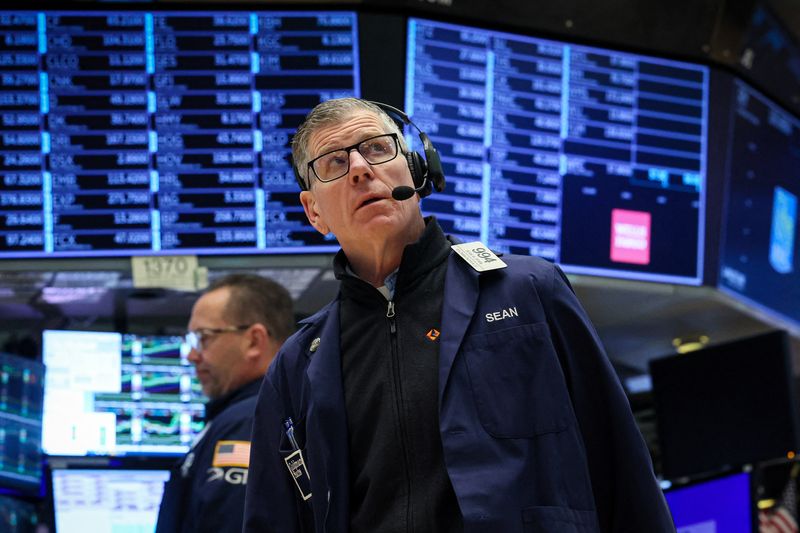
Investing.com - U.S. stock futures tick higher on Friday following a sell-off on Wall Street that pushed the S&P 500 down into correction territory. Elon Musk-led Tesla (NASDAQ:TSLA) warns of the impact of President Donald Trump’s tariffs on U.S. electric car manufacturers, while a metric of consumer sentiment for March is due to be released and Senate Democrats look set to provide enough backing to pass a Republican stopgap bill to avert a federal government shutdown.
1. Futures higher
U.S. stock futures pointed higher on Friday after the benchmark S&P 500 tumbled into correction territory in the prior session as investors further soured over President Trump’s tariff plans.
By 03:44 ET (07:44 GMT), the S&P 500 futures had edged up by 26 points or 0.5%, Nasdaq 100 futures had risen by 123 points or 0.6%, and Dow futures had climbed by 123 points or 0.3%.
The S&P 500 sank by 1.4% on Thursday, bringing it down by 10.1% from a peak reached less than a month ago. The slump, which places the average in what is referred to as a correction, has been driven by a near-constant stream of on-and-off trade pronouncements from Trump and lingering unease over a series of layoffs of federal workers.
In other indices, the tech-heavy Nasdaq 100 shed just under 2.0% and the small-cap-focused Russell 2000 dipped by 1.6%. Both were already in correction. Meanwhile, the blue-chip Dow Jones Industrial Average fell by 1.3%.
Despite the declines, Trump administration officials maintained a steadfast defense of their agenda, particularly moves to place punishing tariffs on friends and adversaries alike, as necessary steps to amend trade imbalances and boost job growth. Treasury Secretary Scott Bessent said on Thursday that he was "not concerned about a little bit of volatility over three weeks."
Undermining sentiment was Trump’s threat on Thursday to slap 200% duties on European wine and champagne in response to an announcement from the European Union of retaliatory import tariffs on a host of U.S. products, including whiskey and Harley-Davidson (NYSE:HOG) motorcycles.
2. Tesla warns of tariff impact
Tesla has warned that it could be exposed to the impact of foreign countries rolling out their own import tariffs as an answer to Trump’s levies.
The electric vehicle giant, whose CEO Elon Musk has become a close advisor to Trump and has overseen a White House effort to downsize the federal government, made the warning in an unsigned letter to the U.S. Trade Representative.
"As a U.S. manufacturer and exporter, Tesla encourages USTR to consider the downstream impacts of certain proposed actions taken to address unfair trade practices," the company wrote.
It noted that past trade actions by the U.S. have resulted in "immediate reactions by the targeted countries," including increased tariffs on EVs imported into those countries. These have pushed up costs to manufacture vehicles in the U.S. and expenses for those same care when exported, resulting in a "less competitive international marketplace for U.S. manufacturers," Tesla said.
Trump has floated place harsh tariffs on cars and parts made around in the world from April 2 in a bid to promote domestic carmaking. However, Tesla flagged that, even with the localization of supply chains, some components are "difficult or impossible to source within the United States."
3. Consumer sentiment data ahead
On the economic calendar, markets will be eyeing the latest gauge of consumer sentiment from the University of Michigan, as traders hope to glean more insight into the recently downbeat state of the American shopper.
The preliminary measure for March is tipped to edge lower. In February, it declined to a seven-month low due to rising worries over the negative effects of Trump’s tariffs on their purchasing power. Notably, the survey found that the dip occurred across age and wealth groups as well as political affiliations.
Expectations for inflation over the coming year also soared to their highest mark since November 2023, while they saw price gains in five years climbing to the highest point since June 2008.
The numbers contributed to burgeoning concerns on Wall Street that Trump’s levies, which economists have warned could drive up recently-waning inflationary pressures, could also weigh on broader economic activity. Data this week has suggested that both consumer and producer price growth cooled in February, although fears remained that the impact of the tariffs is still to come.
4. Senate Democrats seen backing GOP stopgap bill
Senate Democrats are expected to back a Republican-written stopgap bill to avoid a government shutdown on Friday, even as reports suggested lingering internal dissent within the party.
Chuck Schumer, the leading Democrat in the senior chamber of the U.S. Congress, said on Thursday that he would support the measure, in a sign that the party will provide enough votes for it to be advanced. While Republicans control the Senate, they will need some Democratic support to break any potential filibuster against the bill.
Schumer did not specify how other Senate Democrats would vote, with the New York Times (NYSE:NYT) reporting that he surprised many of his colleagues when he announced at a private luncheon that he planned to allow the bill to move forward.
Earlier this week, Schumer had said Democrats were "unified" in their opposition to the legislation, even as a midnight Friday deadline to keep federal funding taps open loomed.
Along with tariffs and a spree of massive federal layoffs, analysts have cited the legislative wrangling in Congress as yet another source of uncertainty for markets in recent weeks.
5. Oil rises amid elusive Ukraine peace deal
Oil prices bounced on Friday after Russian President Vladimir Putin suggested that a U.S. proposal for a ceasefire in the war in Ukraine needed some reworking.
Putin said on Thursday that while Russia supported the plan in principle, more clarifications and conditions on a range of points had to be sorted out before the fighting could come to a halt.
For crude markets, traders are attempting to assess whether a deal may eventually lead to the lifting of sanctions on Russia and the return of energy supplies to the global market. In theory, such an event could drive down oil prices.
Elsewhere, gold continued to hover around an all-time high as escalating trade tensions bolstered its appeal as a safe-haven asset. Bitcoin, meanwhile, is on pace to fall by almost 5% this week, with risk appetite battered and investors cautious ahead of a Federal Reserve meeting next week.
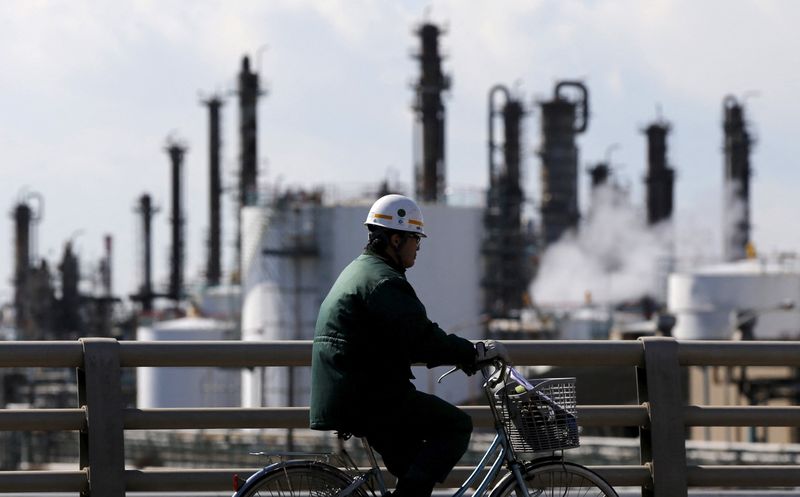
By Makiko Yamazaki and Tom Bateman
TOKYO (Reuters) -Japanese firms agreed to raise wages by more than 5% on average this year, on course for their most substantial pay hike in over three decades - a relief for many workers though it’s unclear if the increases will lead to a meaningful jump in consumer spending.
As annual labour negotiations wrapped up this week, many of Japan’s biggest companies said they met union demands in full. Some, such as electronics conglomerate Hitachi (OTC:HTHIY), delivered record pay increases, though a few sectors were left out of the cold and it remains to be seen how workers at many smaller firms will fare.
Hefty pay hikes have been seen as essential to counter inflation-induced sharp increases in the cost of living. Many companies, emboldened by record profits on the back of a weak yen, are also keen to retain staff amid labour shortages.
More broadly, policymakers have long urged Japan Inc to lift pay so that ordinary citizens might break out of a mindset conditioned by decades of deflation that has made them reluctant to spend with confidence.
The 5.46% preliminary reading from Rengo, a 7 million member-strong group represents the third year in a row of substantive increases for base pay and is likely to mark the highest increase in 34 years.
The number compares with last year’s preliminary reading of 5.28% which was then revised down over several stages to 5.1%. Final tallies are usually lower than preliminary figures as most agreements between smaller companies and their unions are factored in later.
Economists have not been overly optimistic that even substantial wage growth will be enough to spur consumers to loosen their purse strings.
Headline consumer inflation, including fresh food prices, hit 4.0% in January, its highest level in two years.
Nana Nagayama, 51, who was visiting Tokyo from the northern island of Hokkaido on a graduation trip for her daughter, said her husband hasn’t mentioned any expectations of a big increase and expects money to continue to be tight.
"This trip, for example, my husband didn’t come so that we could save money," she said.
Underlining how wage growth is a top priority, Prime Minister Shigeru Ishiba this week ordered authorities to look at ways to encourage higher pay for truckers. He also said the government would look at taking measures so that smaller firms can pass on higher costs to customers, enabling them to pay workers more.
Rengo’s member unions sought an average hike of 6.09% this year, up from 5.85% in 2024 and marking the first time in 32 years that they have asked for more than 6%.
This year, Rengo has focused on achieving strong pay rises for smaller firms.
"The average increase for smaller companies was at its highest for the first time in 33 years but there’s still a big gap between pay at workers in small firms and those at larger ones. As wage talks typically continue at smaller firms in April and May, we will continue to support them," President Tomoko Yoshino told a press conference.
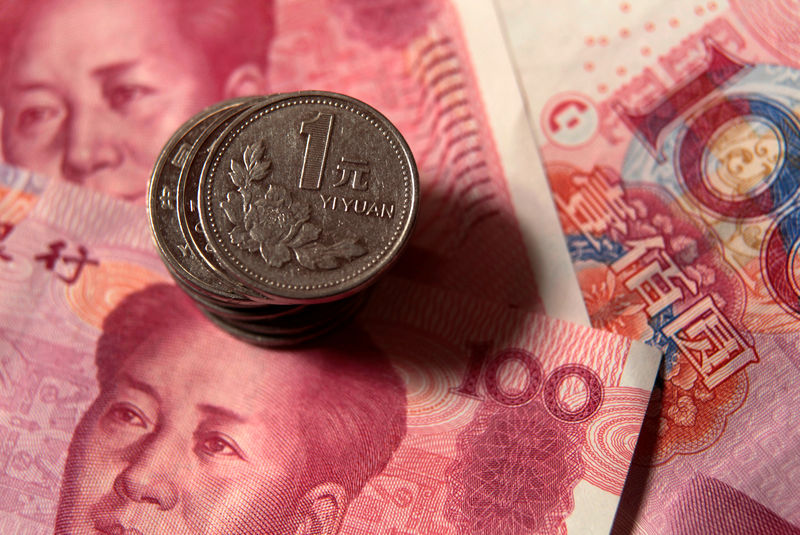
Investing.com-- Most Asian currencies ticked lower on Friday, set for weekly declines, as the U.S. dollar firmed amid more tariff threats from U.S. President Donald Trump, while the Chinese yuan edged up after the central bank pledged fresh stimulus measures to boost economic growth.
The US Dollar Index rose 0.1% in Asian trading, drifting further away from a four-month low it reached last week.
Chinese yuan ticks up on PBoC stimulus pledge
The Chinese yuan’s offshore USD/CNH and onshore USD/CNY pairs edged 0.1% lower, each.
China’s central bank, the People’s Bank of China (PBoC), announced plans on Thursday to implement additional monetary tools aimed at stimulating growth.
These measures include potential interest rate cuts and maintaining the stability of the yuan amid a challenging global economic environment.
Asian currencies set for weekly losses amid escalating trade tensions
Trump escalated trade tensions on Thursday, threatening a 200% tariff on European alcoholic beverages, such as wines and champagnes, if the EU moves forward with its planned 50% tariff on American whiskey.
The EU’s decision, set to take effect on April 1, comes in retaliation to the U.S.’s newly implemented 25% tariffs on imported steel and aluminum.
Moreover, Trump is set to impose reciprocal tariffs all over the globe on April 2, which could further sour investor mood.
The Japanese yen’s USD/JPY pair rose 0.4%, and was set to inch up 0.2% this week.
The Malaysian ringgit’s USD/MYR pair gained 0.2%, on track for a 0.7% weekly rise. The Indian rupee’s USD/INR pair edged up 0.1%.
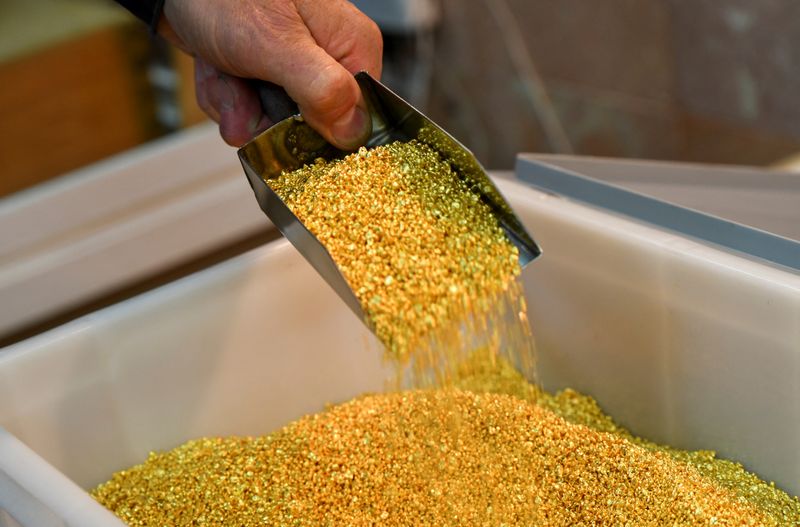
By Anjana Anil
(Reuters) - Gold hit a record high on Friday, as uncertainty over U.S. tariffs and fears of trade tensions propelled prices, along with increased expectations of monetary policy easing by the Federal Reserve.
Spot gold eased 0.1% to $2,983.78 an ounce as of 0132 GMT, after hitting a record high of $2,990.09 earlier in the session, within touching distance of the key $3,000 milestone.
Bullion is also poised to log a second straight weekly rise, with a 2.5% gain so far.
U.S. gold futures rose 0.2% to $2,996.70.
"The risk-off market stance reflects investors’ expectations that trade tensions are likely to get worse before it cools, and are turning to safe-haven gold once again as a hedge against portfolio volatility," said IG market strategist Yeap Jun Rong.
Latest in U.S. President Donald Trump’s multi-front trade war, the European Union responded to blanket U.S. tariffs on steel and aluminium by imposing a 50% tax on American whiskey exports, prompting the president to threaten on Truth Social to charge a 200% tariff on imports of European wines and spirits.
"The psychological $3,000 level is now coming into view for gold prices, and as we approach the second quarter, where reciprocal tariffs could trigger another wave of market turbulence, gold remains a compelling safe-haven asset in an environment where alternatives are scarce," Rong added.
Trump’s tariffs are widely expected to stoke inflation and economic uncertainty, and have prompted gold to reach multiple record highs in 2025.
Gold is seen as a hedge against political risks and inflation.
Markets now await the Fed’s monetary policy meeting next Wednesday. The central bank is expected to keep its benchmark overnight interest rate in the 4.25%-4.50% range.
Non-yielding bullion thrives in a low interest rate environment.
Meanwhile, Russian President Vladimir Putin said on Thursday Russia supported a U.S. proposal for a ceasefire in Ukraine in principle, but sought a number of clarifications and conditions that appeared to rule out a quick end to the fighting.
Spot silver eased 0.2% to $33.72 an ounce, platinum firmed 0.1% to $995.30, and palladium gained 0.7% to $964.32.

